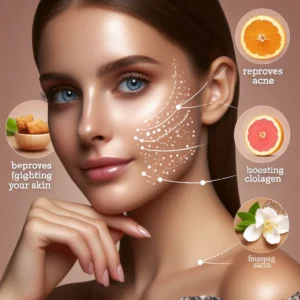Introduction
Healthy eating isn’t just a passing trend—it’s a powerful lifestyle shift that can dramatically transform your body, mind, and overall well-being. In today’s world, where processed foods and unhealthy habits dominate, making the decision to nourish your body with wholesome, nutrient-rich foods is one of the most rewarding choices you can make.
But have you ever wondered what happens when you start eating healthier? How does your body respond to a clean, balanced diet? From increased energy and improved digestion to glowing skin and a sharper mind, the changes can be both immediate and long-lasting.
In this guide, we’ll uncover the remarkable ways your body and mind evolve when you commit to healthy eating. Whether you’re looking to lose weight, boost your mood, or prevent chronic disease, understanding the impact of nutrition will empower you to make sustainable choices for a healthier, happier life.
Let’s explore the incredible transformations that happen when you embrace a healthier lifestyle!
Table of Contents
What Happens to Your Body When You Start Eating Healthier?
1. Improved Heart Health and Reduced Risk of Heart Disease
One of the first and most significant benefits of eating healthier is improved cardiovascular health. Processed foods high in saturated fats, sodium, and added sugars contribute to high blood pressure, cholesterol, and heart disease. By replacing these with whole, nutrient-dense foods, you give your heart the nutrients it needs to function optimally.
- How Eating Fruits and Vegetables Improves Heart Health:
- Leafy greens and berries contain antioxidants that reduce inflammation.
- Whole grains and legumes lower cholesterol levels.
- Omega-3-rich foods like salmon support heart function.
💡 Pro Tip: Incorporating more fiber-rich foods like oats, flax-seeds, and nuts can significantly lower bad cholesterol and improve heart health.
2. Weight Management and Fat Loss
One of the most noticeable changes when you start eating healthier is weight loss. By consuming nutrient-dense foods instead of empty-calorie processed meals, you naturally reduce calorie intake and boost your metabolism.
- How a Balanced Diet Supports Weight Loss:
- Lean proteins (chicken, fish, tofu) promote muscle growth and fat loss.
- Healthy fats (avocado, olive oil, nuts) help keep you full longer.
- Complex carbohydrates (quinoa, brown rice, sweet potatoes) prevent sugar crashes.
💡 Pro Tip: Avoid sugary beverages like soda and replace them with herbal teas, infused water, or fresh juices to cut empty calories effortlessly.
3. Enhanced Digestion and Gut Health
A healthier diet means better digestion, fewer stomach issues, and a healthier gut microbiome. Fiber-rich foods and probiotics play a crucial role in keeping your digestive system in top shape.
- Benefits of Fiber-Rich Foods for Digestion:
- Helps prevent constipation and bloating.
- Supports the gut micro-biome by feeding healthy bacteria.
- Reduces the risk of digestive disorders like IBS.
Foods like yogurt, kimchi, kefir, and sauerkraut introduce probiotics that enhance gut health, while whole grains and vegetables keep digestion smooth.
💡 Pro Tip: Stay hydrated! Drinking plenty of water ensures fiber moves through your digestive tract efficiently.
4. Lower Risk of Chronic Diseases
Switching to a healthier diet helps reduce the risk of chronic diseases like diabetes, cancer, and high blood pressure.
- How Dietary Changes Affect Blood Glucose Levels:
- Reducing sugar intake stabilizes blood sugar.
- Whole foods prevent insulin resistance.
- Antioxidant-rich foods combat inflammation, lowering cancer risk.
Eating more plant-based foods, whole grains, and lean proteins supports long-term health and longevity.
💡 Pro Tip: Add turmeric, garlic, and ginger to meals—they have powerful anti-inflammatory and disease-fighting properties!

The Mental and Emotional Benefits of Healthy Eating
5. Improved Mood and Mental Clarity
Did you know that what you eat directly affects your brain? A balanced diet rich in omega-3s, antioxidants, and B vitamins can significantly improve mood and reduce stress.
- How a Mediterranean Diet Supports Mental Health:
- Omega-3 fatty acids (found in fish and walnuts) reduce anxiety.
- Whole grains stabilize serotonin levels, improving happiness.
- Leafy greens provide folate, essential for brain function.
💡 Pro Tip: Reduce processed foods to avoid mood swings and brain fog caused by sugar crashes.
6. Increased Energy Levels
When you fuel your body with nutrient-dense foods, you experience more energy and endurance throughout the day.
- How a Balanced Diet Improves Energy Levels:
- Protein-rich meals provide lasting energy.
- Complex carbohydrates keep blood sugar stable.
- Iron-rich foods (spinach, lentils, red meat) prevent fatigue.
💡 Pro Tip: Start your day with a protein-rich breakfast like eggs and whole grains to avoid mid-morning crashes.
7. Better Sleep Quality
Your diet plays a crucial role in how well you sleep. Nutrients like magnesium, tryptophan, and melatonin support restful sleep.
- The Effect of a Balanced Diet on Sleep Quality:
- Magnesium (almonds, spinach) helps muscles relax.
- Tryptophan (turkey, bananas) aids in serotonin production.
- Herbal teas like chamomile promote deep sleep.
💡 Pro Tip: Avoid caffeine and sugar before bedtime to enhance sleep quality.

What Happens to Your Skin, Hair, and Appearance?
8. Clearer, Healthier Skin
How Healthy Eating Improves Your Skin
Fruits and vegetables are packed with powerful antioxidants that play a crucial role in protecting your skin from cellular damage caused by free radicals. These harmful free radicals can be triggered by environmental factors like smoking, pollution, and sun exposure. To nourish your skin and protect it from these damaging effects, aim to eat a vibrant array of fruits and vegetables—ideally five portions a day—each offering unique nutrients to enhance your complexion.
The Connection Between a Clean Diet and Glowing Skin
Eating a nutrient-dense, clean diet can lead to radiant, acne-free skin. Here’s how specific healthy foods improve your skin:
- Vitamin C (found in oranges, strawberries) boosts collagen production, which helps keep your skin firm and youthful.
- Healthy fats (such as those in avocados and nuts) combat dryness, providing your skin with the hydration it needs for a smooth, supple texture.
- Hydrating foods (like cucumbers and watermelon) increase skin elasticity, making it appear plumper and more hydrated.
💡 Pro Tip: Don’t forget to drink at least 8 glasses of water daily to keep your skin hydrated and glowing!
9. Healthier Hair and Stronger Nails
The nutrients you consume affect hair growth and nail strength.
- What Happens to Your Hair and Nails When You Eat Healthier?
- Biotin (eggs, nuts) strengthens hair.
- Protein (lean meats, tofu) boosts hair growth.
- Vitamin E (spinach, sunflower seeds) prevents hair breakage.
💡 Pro Tip: Add more omega-3-rich foods to your diet for shinier, stronger hair.

The Long-Term Benefits of Healthy Eating
10. How Healthy Eating Can Increase Life Expectancy and Prevent Age-Related Diseases
One of the most powerful benefits of healthy eating is its ability to extend your lifespan and help prevent age-related diseases. By nourishing your body with the right nutrients, you can support your health in the long term, reduce the risk of chronic conditions, and live a longer, healthier life. Let’s dive deeper into how making mindful food choices can increase life expectancy and protect against the natural aging process.
1. Antioxidants Protect Against Cellular Damage
A diet rich in antioxidants plays a vital role in slowing down the aging process. Antioxidants, found in a variety of colorful fruits and vegetables, work to neutralize free radicals, the unstable molecules that can cause cellular damage. This cellular damage is often associated with aging and the development of diseases like cancer, heart disease, and Alzheimer’s.
By consuming antioxidant-packed foods such as berries, spinach, kale, and nuts, you can fight oxidative stress, support your body’s repair mechanisms, and reduce the likelihood of developing age-related conditions. Over time, regular intake of antioxidants helps maintain your skin’s elasticity, boosts your immune system, and promotes healthy aging at the cellular level.
2. Whole Foods Help Prevent Chronic Conditions
Adopting a diet centered around whole foods—such as lean proteins, whole grains, fruits, and vegetables—can significantly reduce your risk of developing chronic diseases like diabetes, heart disease, and obesity, which are closely linked to aging. When you prioritize these foods over processed or sugary options, you give your body the nutrients it needs to function optimally, prevent inflammation, and maintain a healthy weight.
For example, whole grains like quinoa, oats, and brown rice help regulate blood sugar levels, while lean proteins (found in fish, chicken, and legumes) support muscle mass and bone strength. Healthy fats, such as those in olive oil, avocados, and nuts, help maintain heart health by reducing harmful cholesterol levels and promoting circulation. These diet choices work together to help you age gracefully and reduce your risk of age-related diseases.
3. Hydration Keeps Organs Functioning Properly
Staying hydrated is another essential factor in promoting longevity. Drinking plenty of water and consuming water-rich foods (like cucumbers, watermelon, and leafy greens) helps keep your organs functioning efficiently, supports digestion, and aids in detoxification. Hydration is also crucial for maintaining joint health, promoting healthy skin, and supporting brain function. As you age, your body’s water retention and thirst signals can decrease, which makes it even more important to prioritize hydration through both fluids and hydrating foods.
Proper hydration not only helps prevent kidney stones, urinary tract infections, and constipation but also supports the overall functionality of vital organs, including the heart, lungs, and liver.
💡 Pro Tip: To boost longevity, follow a plant-rich Mediterranean diet, which emphasizes whole grains, vegetables, legumes, healthy fats, and lean proteins. This diet has been linked to improved heart health, reduced inflammation, and longer life expectancy. Eating a variety of plant-based foods and healthy fats like extra virgin olive oil will help keep you feeling youthful and energized well into your golden years.
By embracing these simple but powerful dietary choices, you can increase your life expectancy, reduce the risk of age-related diseases, and enjoy a healthier, more vibrant life at every stage.
11. Better Immune System Function
A nutrient-dense diet strengthens your immune defenses.
- How a Healthy Diet Boosts Immune System Function:
- Vitamin C (citrus fruits) prevents infections.
- Zinc (pumpkin seeds) speeds up healing.
- Probiotics (yogurt, kimchi) support gut immunity.
💡 Pro Tip: Reduce sugar intake—it weakens the immune system!
FAQs
Does eating healthy improve sleep quality?
Yes, eating a nutrient-rich diet can significantly improve sleep quality. Foods rich in vitamins and minerals help regulate sleep hormones, reduce stress, and promote relaxation, leading to more restful and restorative sleep.
How long does it take to see results from eating healthier?
Most people begin to notice noticeable improvements in their energy levels, digestion, and skin clarity within 2–4 weeks of adopting a healthier diet. Some changes, like weight loss or enhanced mood, may take a little longer but are also achievable in the short term.
What are the first changes I will notice?
As you start eating healthier, you’ll likely experience better digestion, increased energy levels, clearer skin, and a reduction in cravings. These initial changes help you feel more balanced and motivated to stick with your new eating habits.
Can I still eat my favorite foods?
Yes! Healthy eating doesn’t mean you have to completely give up your favorite foods. The key is balance and moderation. Occasional indulgences are fine, as long as you focus on making healthier choices most of the time to support your long-term goals.
How does healthy eating affect weight loss?
A whole-food diet helps stabilize blood sugar levels, reduces cravings, and boosts metabolism, making it easier to lose weight naturally. By consuming nutrient-dense foods, you also support a more sustainable and gradual weight loss process, unlike crash diets.
Why does my skin look better after I eat?
Incorporating water-rich foods such as cucumbers, watermelon, and strawberries into your diet can significantly boost skin hydration from within. Proper hydration helps keep your skin looking radiant and plump, while also reducing the appearance of fine lines and wrinkles. When your body is well-hydrated, your skin is better equipped to maintain a healthy, youthful glow.
Conclusion
Eating healthier is one of the most powerful and transformative changes you can make for your overall well-being. But what happens when you start eating healthier? The answer is simple: a cascade of positive changes that benefit both your body and mind. From a healthier heart and improved digestion to glowing skin and sustained energy levels, the benefits of adopting a nutritious diet are truly undeniable. Healthy eating doesn’t just change the way you feel—it impacts your long-term health, reduces the risk of chronic diseases, and supports your body’s natural ability to heal and thrive.
By embracing nutrient-rich foods, rich in antioxidants, healthy fats, and whole grains, you fuel your body with the essential nutrients it needs to function at its best. Whether it’s reducing inflammation, enhancing cognitive function, or boosting mental clarity, the advantages of eating a balanced diet are far-reaching and long-lasting. In addition, healthy eating can help prevent common age-related diseases, improving life expectancy and maintaining vitality as you age.
Starting small and staying consistent with your healthy eating habits is key. It’s important to remember that transformation takes time, but every step counts. Even making small changes, like incorporating more fruits and vegetables into your meals or reducing processed foods, can have a profound impact on your health. Be patient and celebrate your progress along the way—your body will thank you for it.
If you’re ready to experience the full benefits of eating healthier, start by making gradual, sustainable changes to your diet. Prioritize whole foods, stay hydrated, and enjoy the positive effects on your skin, mood, weight, and overall quality of life.
With consistency, you’ll not only notice the difference in how you look and feel but also in your long-term health. So, take the first step today—embrace a healthy diet and experience the transformation that awaits. After all, nourishing your body with the right foods is one of the best gifts you can give yourself, and the results will last a lifetime.
Final Call to Action 🚀
Now that you know what happens when you start eating healthier, why not take the first step today? Try adding one more fruit or vegetable to your meal, drinking more water, or cutting back on processed foods.
Your future self will thank you! 💪✨
you may also like:
What should I do immediately after running? A Complete Guide to Post-Run Recovery
Mediterranean Salad Recipes: A Fresh Path to Health, Flavor, and Joy
Salad Recipes for Weight Loss: The Ultimate Guide to Healthy Eating and Wellness
Unlock the Benefits of Salad: Nutritional Power for Health, Wellness, and Active Living
High Protein Salad Recipes: The Perfect Fit for Health and Active Lifestyles
More relevant articles here >>>
More Health and Wellness Salad Recipes >>>
More Energy and Active Lifestyle Salad Recipes >>>
More Cultural and Seasonal Recipes >>>
references:
“The Science on Weight and Health Is More Complicated Than You Think” by SELF
“10 Foods High in Biotin for Healthy Hair, Brain Function, and More”











